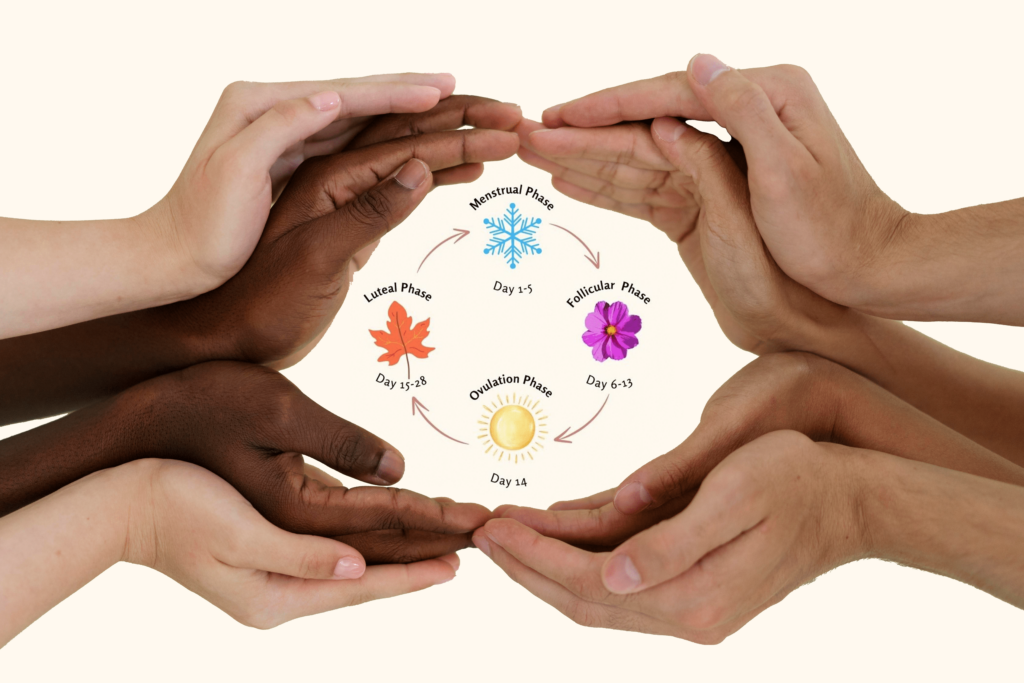Let’s be honest for most of us, understanding our menstrual cycle starts and ends with, “Am I getting my period?” But the truth is, our bodies go through four distinct phases every month, and each one comes with its own hormonal shifts, emotional changes, and even differences in how we look and feel.
It’s not just about bleeding. It’s about energy levels, moods, skin changes, cravings, and confidence. Once you begin to understand your cycle, things start to make sense. That sudden burst of confidence? The days you feel like crying over everything? The bloating, the cravings, the glowing skin , they’re all part of a natural rhythm your body follows.
Let’s walk through each phase, so you can get to know your body better and start working with it, not against it.
1. Menstrual Phase: The Reset (Days 1–5)
This is the phase most people know best ,your period. It begins on Day 1 of your cycle and usually lasts 3 to 7 days.
What’s happening:
Your uterus is shedding its lining because pregnancy didn’t occur. Hormone levels (especially estrogen and progesterone) are at their lowest, which can leave you feeling tired, sensitive, or introverted.
How you might feel:
- Fatigued or low energy
- More emotional or reflective
- Cramps, bloating, or back pain
- Less confident in your body
How to care for yourself:
Think of this as your body’s reset button. Give yourself permission to slow down. Rest, stay warm, hydrate, and eat nourishing, iron-rich foods like spinach, lentils, and red meat. Light movement like stretching or slow walks can help ease cramps and boost mood.
2. Follicular Phase: The Reawakening (Days 6–13)
Once your period ends, things start looking up physically and emotionally.
What’s happening:
Estrogen levels rise as your ovaries prepare to release an egg. Your energy, mood, and even skin begin to improve.
How you might feel:
- Clear-headed, energized, optimistic
- More motivated and sociable
- Skin starts to glow
- Feeling stronger and lighter in your body
How to care for yourself:
This is a great time to be social, start new projects, and try workouts that require more energy. You’re likely to feel more focused and confident. Eat balanced meals, get some sun, and enjoy the momentum — this is your “spring” phase.
3. Ovulation Phase: The Peak (Around Day 14)
This is the shortest but most powerful phase , the time when you’re most fertile and hormonally magnetic.
What’s happening:
Your body releases an egg. Estrogen is at its peak, and your libido may rise thanks to a surge in luteinizing hormone (LH).
How you might feel:
- More confident, bold, and flirtatious
- Increased sex drive
- Physically stronger and more coordinated
- Skin may be clearer, lips fuller, and you may even smell more attractive — wild, right?
How to care for yourself:
Lean into this empowered version of yourself. Plan presentations, dates, or creative tasks during this window. Eat foods rich in antioxidants and stay hydrated. If you’re trying to conceive this is the time.
4. Luteal Phase: The Slow Down (Days 15–28)
Ah, the famous PMS phase , but there’s more to it than just mood swings.
What’s happening:
Progesterone rises to prepare for a possible pregnancy. If pregnancy doesn’t occur, hormone levels drop again, leading to the next menstrual phase.
How you might feel:
- Irritable, weepy, or anxious
- Craving comfort foods
- Bloating, breast tenderness, and acne may appear
- Low motivation, higher fatigue
- Less body confidence or social energy
How to care for yourself:
Your body is asking you to slow down. Honour that. Choose calming activities, say no when you need to, and get extra sleep. Magnesium-rich foods (like nuts and leafy greens) and warm baths can ease tension. You’re not “being dramatic” ,your body is going through a lot.
The female body is an incredible thing. It shifts and adapts every single week in ways most of us were never taught to notice. But the more we understand it, the more we can show ourselves grace and compassion.
Your cycle isn’t something to fight. It’s something to honour. And knowledge is your first step toward feeling at home in your own body.




